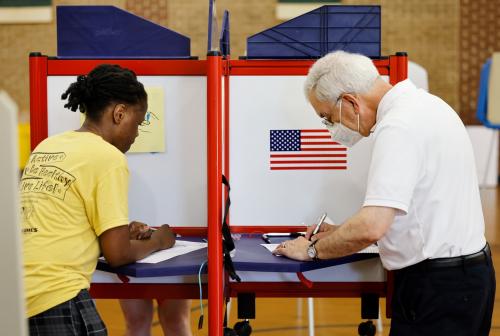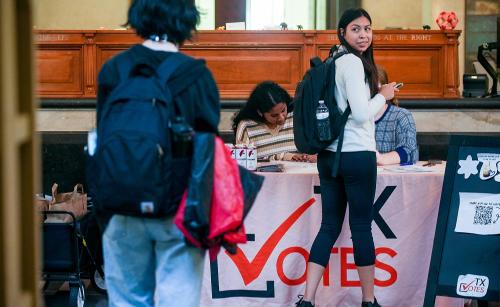

6:00 pm EDT - 8:00 pm EDT
Past Event
Content from the Brookings Doha Center is now archived. In September 2021, after 14 years of impactful partnership, Brookings and the Brookings Doha Center announced that they were ending their affiliation. The Brookings Doha Center is now the Middle East Council on Global Affairs, a separate public policy institution based in Qatar.
Following a heated electoral campaign, which featured high levels of spending and much international attention, on June 7, 2009, Lebanese citizens voted for a new parliament in a peaceful election process that produced results that were accepted both domestically and internationally. On June 23, 2009, the Brookings Doha Center hosted a policy discussion to examine the elections’ broader policy implications for Lebanon and the region, to shed some light on the technical aspects of the elections and the monitoring process, and to explore potential reforms to the Lebanese electoral law and its underlying sectarian political system. The panel consisted of Ziad Abdel Samad, Secretary General of the Lebanese Association for the Democracy of Elections, Karim Makdisi, Assistant Professor of Political Studies at the American University of Beirut, and Hady Amr, Director of the Brookings Doha Center and Saban Center Fellow. Hiba Zeino, Communications Coordinator of the Brookings Doha Center, moderated the discussion.
After a brief introduction by Zeino, Abdel Samad opened up the discussion by first giving some background on the context of these elections. He explained that Lebanon had been “kept on hold” after a long political crisis and that the process of reforming the electoral system has been ongoing for a number of years. He highlighted in particular the Doha Agreement brokered in Qatar on May 21, 2008, which ended an 18-month conflict between Lebanese factions and established General Michel Sleiman as the President. Reform efforts for a new electoral law have been continuing since and have already included new laws on campaign spending and media advertising, in addition to the establishment of a supervisory commission responsible for overseeing the elections. Abdel Samad explained that the Lebanese Association for the Democracy of Elections opened 24 offices in numerous districts in order to be close to the campaigns and voters and that it hired 2,500 trained volunteers for Election Day itself, to make sure the election was carried out legally and properly.
Makdisi continued the conversation, stressing what he saw as the two most important facets of the election. On the one hand, the elections were technically a success. People were motivated and mobilized and there were well-organized NGOs to handle issues that may have arisen. It was important for Lebanon and the region to have this example of a peaceful transition of power. On the other hand, Makdisi also emphasized that on a substantive, underlying structural level, his assessment of the elections was more negative. The elections did not bring any kind of new order with a new political class, but rather the same cast of characters returned to power, with the vast majority of the seats even decided before the elections took place. He argued that the electoral law as it stands merely preserved elite interests and no real progressives were put into power. Makdisi was also disappointed that the campaigns employed the rhetoric of fear and included little discussion of policy on important issues, including the economy, the environment, and social problems.
Based on his experience monitoring elections in South Africa, Bosnia, and the Palestinian territories, Amr offered some additional reflections on the mechanics of these elections. He argued that the elections in Lebanon indicate that transparency is of great importance. He also argued that having both domestic and international observers can be invaluable to both the domestic constituency and the international community’s acceptance of the results. Amr brought up the recently contested elections in Iran in contrast, suggesting that perhaps if the Iranian government had allowed election monitors, there would not be such a high level of doubt in the results. Amr also suggested that given both elections, it is becoming increasingly clear that the Middle East has reached a point when leaders can no longer get away with blatant fraud without some type of protest. When asked about the potential influence of President Obama regarding the election results, Amr remarked that though he could not draw a direct line between Obama’s speech in Cairo and the election results in Lebanon, the new administration’s approach of engaging in respectful dialogue has likely made it more difficult for the region to have knee-jerk anti-American reactions.
Following the remarks of the speakers was a detailed question and answer session. Audience members inquired about the sectarian system in Lebanon and if this is a hindrance to real democracy. Others were curious about what would be necessary to invoke real change to the Lebanese political system and who would be responsible for carrying out these efforts. There was also a question about how to engage youth in the political process, which might help ease the “brain drain” that currently afflicts Lebanon. The panelists explained that new reforms were certainly necessary to tackle all of these issues and as a start, Lebanon needs to adopt a proportional system in the electoral law to ensure equitable parliamentary representation. Abdel Samad also cited in particular the efforts to increase the participation of women in politics and reforms to make it possible for non-resident Lebanese citizens to vote while overseas in the next election. Makdisi stressed that political platforms in Lebanon need to move from traditional rhetoric to address vital issues such as the economy, growing class differences, and the environment.


Elaine Kamarck, Deirdre Keenan
May 9, 2024

Gabriel R. Sanchez, Jordin Tafoya
May 8, 2024

Constanze Stelzenmüller, Fred Dews
May 3, 2024